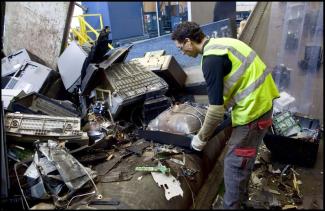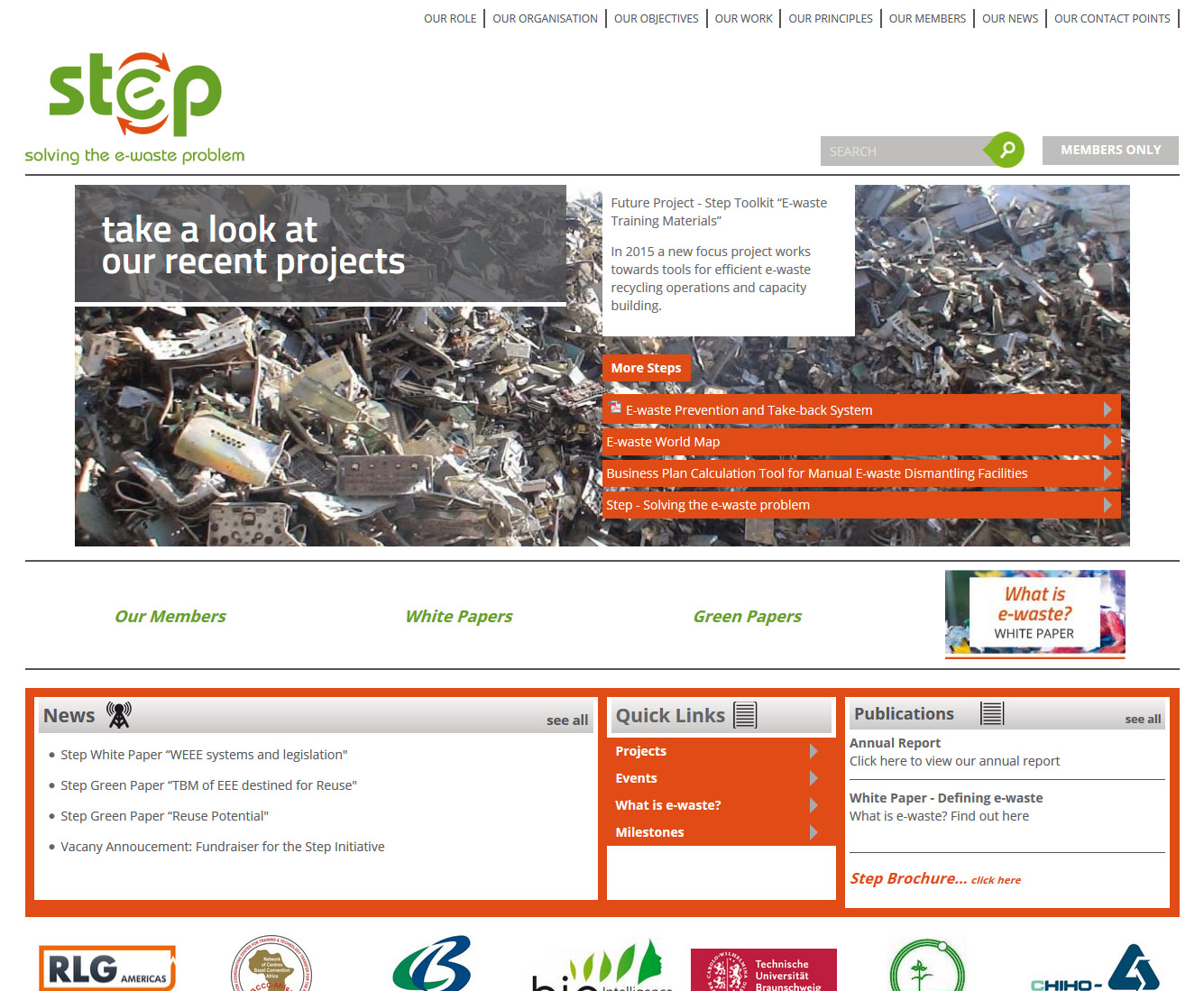Recycling
“22 kilogrammes per person and year“

Why can’t we simply throw e-waste away?
This kind of waste contains many different substances. A normal mobile phone contains about half of the elements of the periodic table, including gold, silver, palladium as well as cadmium and others. Some of them are quite valuable, and we’ll lose them if they end up in household garbage. We’ll need them to keep production cycles going. By using state-of-the-art methods, we can reclaim them, and if we do not, these essential resources will become scarce in the long run. We are actually throwing gold and other precious metals away.
Do health hazards result from inadequate handling of e-waste?
Yes, and the reason is that waste recycling is done often in the informal sector in developing countries and emerging markets. A typical issue is that people want to get the copper from inside cables, and they burn the plastic covers in open fires. That results in furans and dioxins, potent toxins, contaminating the smoke. The people concerned are aware of these problems. Their eyes get sore, they have breathing difficulties and kidney problems. Reduced fertility and other health problems also occur. However, the people concerned depend on waste recycling. It is their livelihood. Another issue is that people use acids to sluice gold from circuit boards. Health impacts include cauterisation and skin disorders. Moreover, the acids are often not disposed of properly, so the environment suffers too.
Is there a kind of global trade in which rich nations get rid of their e-waste to the detriment of developing countries? I recently read on the website of the UN Environmental Programme (UNEP) that 70 % ends up in unknown and unreported destinations.
The 1st Global E-Waste Monitor of UNU with data from 2014 shows that from an annually generated 41.8 million tonnes of e-waste only approximately 6.5 million are collected by official take-back schemes. These are only 15 % of the total generated. But this does not mean that 85 % are shipped to developing countries or economies in transition. There are several scenarios where e-waste ends up in addition to official collection. Much goes into waste bins and is ultimately incinerated or land-filled. A certain portion is collected outside official collection schemes, for instance by metal recyclers. And a smaller amount goes into informal collection and recycling in developing countries or economies in transition. Interpol, UNU and other partners recently estimated these exports from the EU to amount to 10 to 15 %. Exports of e-waste from OECD nations to any developing countries or emerging markets are illegal because the latter normally lack the infrastructure for appropriate, multi-phase recycling. Exporting second-hand goods for further use is legal however. It is very hard for the authorities including governmental agencies to tell the difference. Many European consumers think that Africans would like to have their old Pentium-3 computers, for example, or old tube TV sets. Even if those gadgets still work, however, Africans too are of the opinion they are outdated, so there is no market for them. If they are declared to be second-hand goods and exported to Africa, they end up in the hands of rag pickers. This is how the idea has emerged that exporting is a disposal strategy. It may sometimes happen that a small company intentionally misdeclares container shipments as second-hand, but that really does not work out as a long lasting business model. The logistical challenges, and accordingly the costs, are substantial.
Do you know what share of Germany’s e-waste is exported to developing countries and emerging markets?
About 10 %, plus/minus five percent. That is what UNU found out in cooperation with Interpol and other agencies in an EU funded project. It is important to understand, however, that there is an environmentally valid reason to keep using second-hand electric and electronic goods in developing countries and emerging markets: The gadgets are becoming ever more complex, and their production requires huge quantities of resources. In an environmental perspective, it makes sense to extend the life cycle also in developing countries, even when the first owners already want yet more recent technologies. Many people in Africa or Asia have an interest in used second-hand items.
What becomes of broken gadgets?
That is the challenge. All too often, they are not recycled according to the state of the art. As I said earlier, waste management is normally done in the informal sector in developing countries and emerging markets. The ones to suffer are the poor – the people who depend on this kind of work. In most cases, however, the scenario is politically accepted. It is very difficult to formalise waste management. Many people are involved, and there are many links in the chain. As a matter of principle, this kind of waste should be sent back to industrialised nations, but that is not done normally. The industrial capacities needed for up-to-date recycling exceed the capacities of developing countries.
What can be done to improve matters?
We need more awareness rising. In Germany, the distorted idea of e-waste being a problem of developing countries is quite common. People think of black children on garbage dumps. They neither know that we generate 22 kilogrammes of e-waste per person and year in Germany, nor that future production cycles are at risk because precious resources are thrown away. In any case, it is absurd that public agencies meticulously collect waste paper in Germany, while we do not have a good system to collect e-waste. The easiest way to get rid of it is the garbage bin, though waste of electrical or electronic equipment needs to be taken to recycling centres. Some e-waste items, but not all, can be returned to retail shops, moreover.
Is this situation typical of advanced nations?
No, it is not, and Germany could learn from others. In Switzerland, for example, the share of properly collected e-waste is much higher. The situation in Germany is not satisfying. We do not even have good data. We know some basic figures, such as the 22 kilogrammes I just mentioned, but in regard to the complex patterns of what chemicals ultimately end up where, we know much less than our neighbours in France, Belgium or the Netherlands do.
Why is that so?
The reason is the waste management system that German legislators have designed. Its emphasis is on competition, so we now have too many small recycling systems competing with one another. In contrast, some of our neighbouring countries emphasise compliance, with manufacturers paying for state-of-the-art recycling of their goods. The German system is not appreciated much internationally, even though most German’s think we are world champions in sorting garbage.
Is the international institutional order adequate for getting a grip on the issue?
We have the necessary regulations, but implementation is weak. Because resources are in demand, however, there is pressure to improve matters. However, different nations are taking different approaches, and there is a lack of coherence. Accordingly, our programme at the UN University is working on getting all UN agencies on board.
Rüdiger Kühr heads the Sustainable Cycles (SCYCLE) programme at the UN University’s Bonn campus as well as the international intiative StEP (Solving the E-Waste Problem).
kuehr@unu.edu








